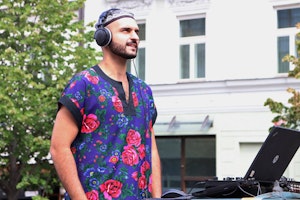Roma Youth Encouraging the Volunteer Spirit at Home
By Andy Haupert
Ludovic Rafi in Romania
“I knew this was a need that we could respond to easily with little or no funding,” said Ludovic Rafi, a 29 year old Roma graduate from Romania. “Also, I thought that participants would see how simple it is to clean the area and follow our example.” With a degree in economics and then serving as an intern in the European Commission’s Directorate General for Enlargement, Rafi had undertaken a community service project with the goal of cleaning up his neighborhood in the village of Mintia.
Mintia is home to about 100 Roma families who live in a compact community on the periphery. The families occupy six former workers’ barracks from the 1970s and three newer apartment blocks. The buildings surround a field which serves as the children’s playground but has increasingly become overgrown and trash-strewn
Unperturbed, Rafi and four other young associates planned a clean-up day that would involve 50 to 60 people from the community. The project was initiated, driven and partly financed by the Roma community themselves. Rafi and his group promoted the event to neighbors, stuck up posters, received donations of refuse sacks from local government and collected gloves and other materials.
The participants who arrived for the clean-up on a morning in early March 2012 ranged in age from 10 to 35, with the exception of one 50-year-old. “It was interesting to hear the reactions of the residents who watched the clean-up,” reflected Rafi, “Some approved of it, and others said that the authorities, not young people, should be responsible for doing the work. But by the end of the day, even some of the skeptics had joined in. I think that each action of this type will help make volunteer work and community service more popular.
To encourage this volunteering spirit, the Open Society Roma Initiatives include a community service aspect to the internship program for young Roma which it operates with the European Commission. Applicants are asked to propose a small community-service project that addresses an issue of importance to them and their local Roma communities. Successful applicants are provided with mentoring and support for developing their projects, which they carry out following their participation in internships or other programs.
On the merit of these projects the final say is best left to Rafi. “We are receiving a great opportunity, so we should take our turn and do something for the people from our community, for those who don’t have the same opportunity. And by volunteering we can inspire others to take responsibility for their own situations.”
Senada Lamovska in Macedonia
“Having been away from my city and having no contact with local Roma for more than 10 years, I was very happy to have the chance to reconnect by doing something for the community,” said Senada Lamovska. “After such a long absence it was difficult to know what would be the most useful thing to do for the Roma in my town, so I went with what I know best. I can teach French and Romani, so I decided to teach the Romani language, because in my town the language is forgotten. Turkish is the mother tongue. I wanted to introduce young Roma, high school students to Romani history and the basics of the language
At the same time I was happy to get to know the youngsters from the community, to talk with them and see what their understanding of Romanipe is, to see what their visions for the future are—if they want to continue their education and how I could help them with advice or information. In other words, I wanted to share my experience and knowledge.”
During February and March 2012, Lamovska, in partnership with the local organization Avena Kocani, taught a series of six one-hour introductory classes in Romani history and language to students at the Koso Vikentiev Secondary School in Kocani. In the history sessions students had the opportunity to grapple with such fundamental topics as “Where do we come from?” and “Who are the Roma today?” The language classes introduced them to the Romani alphabet, basic grammar and everyday vocabulary.
Lamovska was surprised at the level of enthusiasm from the students and their openness to learn Romani history and language. For most of them, it was their first encounter with these subjects, particularly within the scope of regular schooling. “I was happy to find that Roma children in my town were interested in the language,” she said, “Having Turkish as their mother tongue, many would say, they consider themselves to be Turks. I believe that learning Romani history, language, and culture is very important for their Roma identity.”
Reflecting on the community-service requirement, Lamovska said, “I think that it is a good idea to continue with this practice. Many students finish their education and forget about their communities. It is a good idea to remind them to go back to the place from where they started, and share the knowledge they have gained… I have done many voluntary projects in the places where I have lived and worked, and I think this requirement sends a good message to young people: sometimes we should help without expecting to be paid.”
Until February 2024, Andy Haupert was an associate policy officer for the Roma Initiatives Office.


